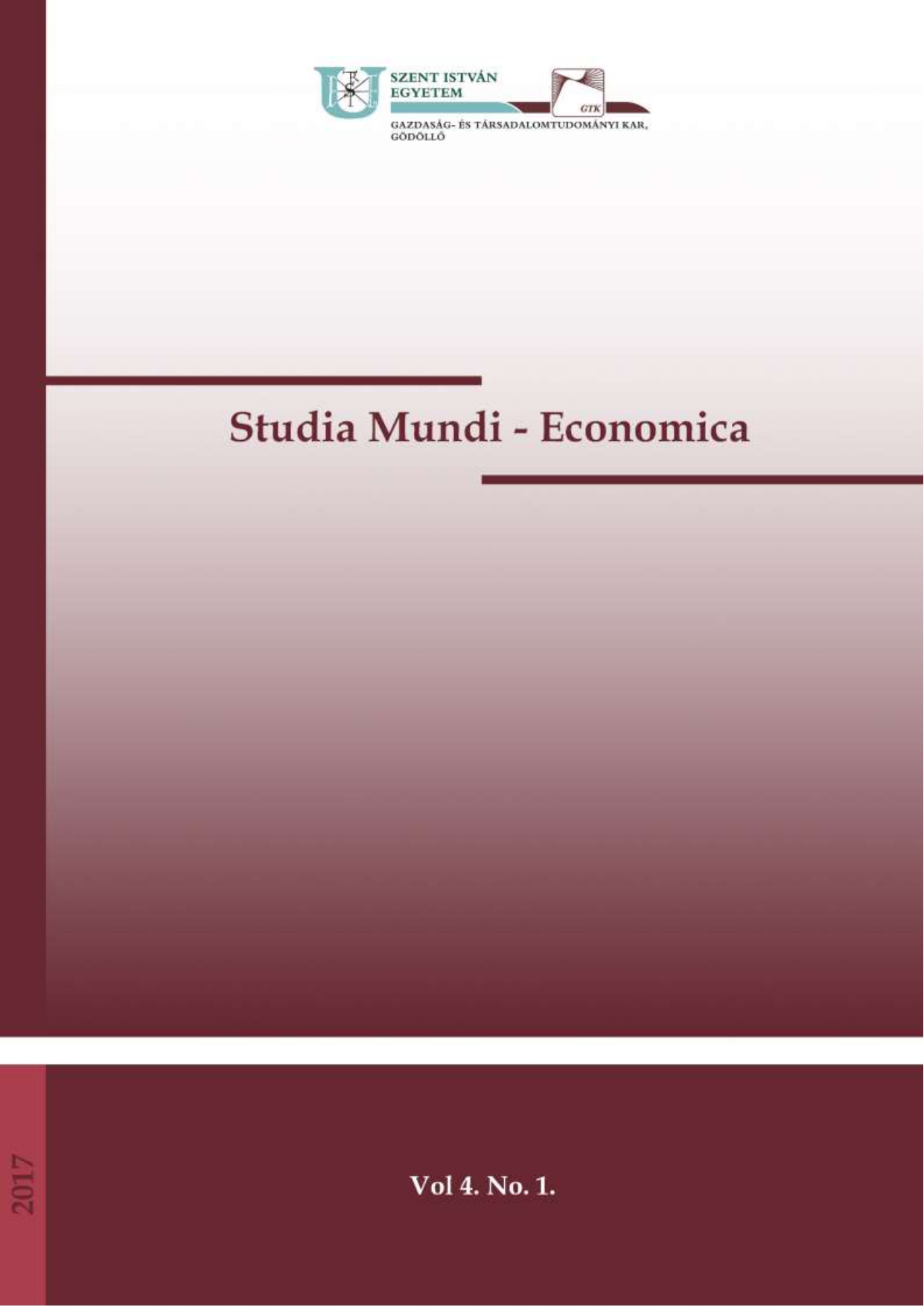The comparative analysis of the relevance of labour market competencies from the aspect of employers and young (under)graduates of higher education
DOI:
https://doi.org/10.18531/Studia.Mundi.2017.04.01.82-93Keywords:
kompetencia, emberi erőforrás-menedzsment, munkaerőpiac, munkáltató, munkavállalóAbstract
Competencies have become one of the key terms of HRM as they help pointing out the factors that are necessary to have excellent employees with outstanding performance over the average. Our paper examines what main business competencies (can) enhance the success and competitiveness of employees from the aspect of employers on the one hand, and what competencies (under)graduate students think will be of vital importance in their selection. It is one of our further objectives to analyse the correlations and point out the possible differences in the opinions of both parties. Our research also examines the role of competencies whether they have been appreciated or depreciated nowadays. Based on literature review, a competence structure tailored to the special features of the Hungairan labour market was also tested.
References
Fakkermanns, J., Schauferi, W. B., Brenninkmeier, V., Blonk, R. W. B. (2013): The role of career competencies in the Job Demands-Resources Model. Journal of Vocational Behaviour, 83, pp. 356-366. ISSN 0001-8791
Bárdos I. K., Varga E., Szira Z., Pallás E. (2014): The significance of trainings and competencies in HR. In: Takácsné György K. (szerk.): Az átalakuló, alkalmazkodó mezőgazdaság és vidék: XIV. Nemzetközi Tudományos Napok: Gyöngyös: Károly Róbert Főiskola, pp. 1547-1557, . ISBN 978-963-9941-75-5
Barratt, G. V., Depinet, R. L. (1991): A reconsideration of testing for competence rather than for intelligence. American Psychologist, 46: (10), pp. 1012-1024. ISSN 0003066X, eISSN 1935-990X
Berger, L., Berger, D. (2003): The Talent Management Handbook: Creating organizational excellence by identifying, developing, and promoting your best people. Mcgraw-Hill. 466 p. ISBN 978-007-173905-4
Bitterova, M., Hajós L. (2009): The School Project Management. Influence on the Economy of Education. Bulletin of the Szent István University Gödöllő. (1) pp. 258 - 262. ISSN 1586-4502
Boda, M. A. (2016): A gazdasági diploma munkaerőpiaci helyzete. – Egy lépéssel közelebb a piacképesség felé üzleti szimulációs szoftverekkel. Tantárgyi vizsgadolgozat. Kézirat
Boyatzis, R. E (1982): The Competent Manager: A model for effective performance. New York: Wiley. 328 p. ISBN 0–471–09031‐X.
Csehné Papp I., Hajós L. (2014): Education and working life in Hungary. Acta Tchnica Corviniensis – Bulletin of Engineering, 2: pp. 105-110. e-ISSN 2067-3809
Czeglédi Cs., Juhász T. (2013): Role of Tertiary Education in Career and Lifelong Learning Among. The Journal of Education Culture and Society. (01): pp. 190-198. ISSN 2081-1640
Czeglédi Cs., Juhász T. (2015): A felsőfokú oktatásban tanulók munkaerő-piaci felkészültsége a munkáltatók szemszögéből. Taylor: Gazdálkodás- és Szervezés- tudományi folyóirat. (1-2): pp. 286-293. ISSN 2064-4361
Emery, Y. (2002): Added value in HRM: An analysis of the competency management process, Horton-Hondeghem-Farnham. pp. 17-30. ISSN 1382-4414
Ferencz Á. Nótári M. (2012): The management of the education and the students in the Kecskemét College. Annals of Faculty of Engineering Hunedoara – International Journal of Engineering. 10:(2) pp. 87-90. ISSN 1584-2665, eISSN 1584-2673:
Ferencz Á. Nótári M., Berde Cs. (2013): Management of agrarian education in Hungary. Annals of Faculty of Engineering Hunedoara – International Journal of Engineering 11:(3) pp. 269-272. ISSN: 1584-2665, eISSN: 1584-2673:
Ferencz Á. Nótári M. (2014).: Agricultural management in the Hungarian higher education. Lucrari stiintifice: Seria 1 Management 16:(2) pp. 31-36. ISSN 1453-1410
Gáthy V. (2013): Öregedő Európa, fogyó szakemberek – fiatal India, egyre több diplomás. Társadalomkutatás, 31:(1) pp. 40-54. ISSN 0231-2522, eISSN 1588-2918
Gulyás L. (2001): A munkanélküliség kezelésének nemzetközi és magyarországi tendenciái. A Pécsi Tudományegyetem Regionális Politika és Gazdaságtan Doktori Iskolájának Évkönyve. 370-388. p. ISBN 978-963-642-271-4, ISSN 1416-0986
Gulyás L. (2008): Regional disparities of Hungarian labour market 1990-2005. Forum Geografic. 7(1): pp. 128-135. ISSN 1583-1523
Hajós L., Berde Cs., (szerk.) (2008): Emberi erőforrás gazdálkodás. Budapest: Szaktudás Kiadó Ház, 171 p. ISBN 978-963-9732-47-6
Hajós L., Dolmány F. (2001) A munkaerő mennyiségi növelésének lehetőségei Magyarországon. Gazdálkodás. XLV: (3) pp. 1-15. ISSN
Hajós L., Czeglédi Cs., Marosné Kuna Zs., Szira Z., Varga E. (2016): Felsőoktatásban végzettek vállalkozói szellemének és releváns munkaerőpiaci kompetenciáinak megítélése. Polgári Szemle: Gazdasági és társadalmi folyóirat. 2:(4-6) pp. 263-282 ISSN 1786-6553, eISSN: 1786-8823
Kiss P. (2010): Felsőfokú kompetenciákról nemzetközi kitekintésben. Online elérhetőség: https://www.felvi.hu/pub_bin/dload/DPR/dprfuzet3/Pages17_26_kiss.pdf, [letöltve: 2015- 12-16]
Kiss T., Schmuck R. (2007): Szimulációk az oktatásban. A virtuális gazdaságok világa Megjátszott ökonómia, XV. (2) Online elérhetőség: http://feszek.pte.hu/ujsag.php?tipus=cikk&cikk=1907&rovat=690&szam=67&evfolyam=11 [letöltve: 2015-12-16]
Magyari J., Hajós L.: (1998): A kisüzemi tevékenységek tervezése. Gazdálkodás. XLII:(4) pp. 52-56. ISSN 0046-5518
Roizen, J., Jepson, M. (1985): Degrees for Jobs: Employer Expectations of Higher Education. Guildford: SHRE and NFER-Nelson. 435 p. IBSN 1-85059-005-2
Spencer, L. M., Spencer, Jr. S. M. (1993): Competence at Work: Models for Superior Performance. Boston: Wiley, 384 p. ISBN 978-0-471-54809-6
Ulrich, D., Allen, J., Brockbank, W., Younger, J. Nyman, M. (2009): HR transformation. Building Human Resources from the Outside. In. New York: McGrawHill. 256 p. ISBN 978-0-071-6387-8
Varga E., Czeglédi Cs., Hajós L. (2015): The examination of personal competencies as collateral of success from the point of view of students. Annals of Faculty of Eneneering Hunedoara – International Journal of Engineering. XIII:(4) pp. 117-122. ISSN 15842665, eISSN 1584-2673
Zéman Z., Fónagy-Árva P., Majoros Gy. (2003): Értékmérési módszerek alkalmazási lehetőségeinek vizsgálata. Pénzügyi Szemle / Public Financal Quarterly. 8:(4) pp. 380403. ISSN 0031-4960, eISSN 2064-278
Zéman Z., Majoros Gy. (2010): Evaluation of the principle. Bulletin of the Szent István University Gödöllő. (1) pp. 348-368. ISSN 1586-4502
Downloads
Published
Issue
Section
License
Copyright (c) 2017 Varga Erika, Szira Zoltán, Boda Helga, Hajós László

This work is licensed under a Creative Commons Attribution-NonCommercial-NoDerivatives 4.0 International License.
A folyóirat Open Access (Gold). Cikkeire a Creative Commons 4.0 standard licenc alábbi típusa vonatkozik: CC-BY-NC-ND-4.0. Ennek értelmében a mű szabadon másolható, terjeszthető, bemutatható és előadható, azonban nem használható fel kereskedelmi célokra (NC), továbbá nem módosítható és nem készíthető belőle átdolgozás, származékos mű (ND). A licenc alapján a szerző vagy a jogosult által meghatározott módon fel kell tüntetni a szerző nevét és a szerzői mű címét (BY).






